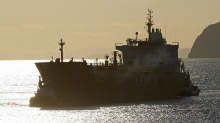Repsol-led group makes big oil, gas find off coast of Brazil
 Spanish oil firm Repsol confirmed a large oil and gas find off Brazil on Thursday in a discovery that is likely to attract more explorers to one of the world’s hottest regions for oil and gas drilling.
Spanish oil firm Repsol confirmed a large oil and gas find off Brazil on Thursday in a discovery that is likely to attract more explorers to one of the world’s hottest regions for oil and gas drilling.Repsol, in partnership with China’s Sinopec , Norway’s Statoil and Brazil’s Petrobras , said the discovery in the Campos basin could hold more than 1.2 billion barrels of oil equivalent, a figure that equals more than Brazil’s expected total oil output for this year.
“This is quite a large find for Brazil and like all big finds, it’s going to encourage firms that have expertise in deepwater drilling to invest there,” said DNB oil market analyst Torbjoern Kjus.
Brazil is key to Repsol’s Latin American explorations after Argentina announced in April that it would nationalize the company’s Argentine unit YPF.
The Brazilian discovery, which includes more than 700 million barrels of recoverable crude oil and three trillion cubic feet of natural gas, could result in peak production of about 300,000 barrels a day, Mr. Kjus added.
The firms did not provide further detail on development plans but Statoil exploration chief Tim Dodson said production was unlikely to start before 2020.
“It’s a very good reservoir and it is light oil, so I think it is appropriate for a good production rate,” Mr. Dodson said, adding it was too early to provide more specific plans.
Oil firms in Brazil such as Petrobras, Royal Dutch Shell and Chevron, are expected to produce more than eight million barrels of oil equivalent a day by 2020, an amount that could allow Brazil to surpass the United States as the world’s No. 3 oil producer after Russia and Saudi Arabia.
Most of that oil is expected to come from giant, deep-water oil fields off Brazil’s coast near Rio de Janeiro and Sao Paulo, including the Campos Basin, home to several billion-barrel-plus fields and some of the world’s largest discoveries in the past 30 years.
The country’s main offshore regions, the Campos Santos Basins, contain as much as 100 billion barrels of oil, according to the Brazilian Petroleum Institute at the State University of Rio de Janeiro.
That would be enough to supply all of the needs of the United States, the largest consumer, for about 14 years, according to BPI and Reuters calculations.
The discovery, in so-called pre-salt blocks, also improves prospects for exploration off Angola, on the other side of the Atlantic, as the two areas have similar geology.
Still, analysts warned that the nature of the discovery makes production uncertain given how high production costs can rise in such extreme circumstances.
“These barrels will be among the most expensive to produce and if onshore discoveries become more abundant, these will simply not get developed,” DNB’s Mr. Kjus said.
Oil firms have been investing increasingly in developing onshore shale liquids, and if those efforts succeed, firms would be able to reduce costs.
“These shale fields can have break-even costs at around $50 while deepwater costs can be as much as $100 per barrel,” Mr. Kjus said.
Repsol Sinopec Brasil, a joint venture between Repsol and Sinopec, is operator of the latest discovery and holds 35 per cent while Statoil has 35 per cent and Petrobras has 30 per cent.
The consortium is currently preparing an appraisal plan to be presented to the Brazilian National Agency of Petroleum, Natural Gas and Biofuels.
You can return to the main Market News page, or press the Back button on your browser.

